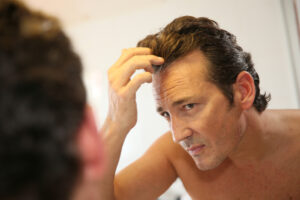Hair loss is more than just a physical condition. It can have a profound psychological impact on individuals, affecting their self-esteem, body image, and overall well-being.
According to the American Academy of Dermatology, approximately 80 million people in the United States experience hereditary hair loss, also known as androgenetic alopecia. This extremely common condition can take a serious toll on anyone’s mental wellness. Understanding the psychological aspects of hair loss is crucial in addressing the challenges and finding effective coping strategies.
In this article, we will explore the psychological impact of hair loss and explore the emotional journey that individuals with hair loss often experience, as well as some hair loss solutions.
The Self-Esteem Struggle
Hair loss can significantly impact self-esteem, leading to feelings of self-consciousness and inadequacy. Individuals may become increasingly concerned about their appearance and worry about how others perceive them. This decline in self-esteem can impact various aspects of life, including personal relationships and professional endeavors.
Body Image and Identity
Hair is often intricately tied to our sense of identity and how we perceive ourselves. Hair loss can result in a loss of confidence and disrupt one’s perception of self, leading to a shift in self-identity. Coping with these changes and finding ways to maintain a positive self-image can be an ongoing challenge for individuals experiencing hair loss.
Emotional Distress and Anxiety
Hair loss can trigger emotional distress, causing anxiety and even depression. The fear of being judged or ridiculed due to a changing appearance can lead to social anxiety and avoidance of certain social situations. It is crucial to address these emotional struggles and seek support to maintain emotional well-being during the hair loss journey.
Impact on Quality of Life
Hair loss can have a significant impact on an individual’s overall quality of life. It may affect their ability to participate in activities they once enjoyed, hinder their social interactions, and lead to a decreased sense of overall happiness. Recognizing the multifaceted impact of hair loss on one’s life can empower individuals to seek appropriate solutions and support.
Hair Loss Solutions
While some forms of hair loss cannot be reversed, there are lots of options when it comes to restoring and/or replacing hair, such as:
- Human Hair Wigs: Natural-looking wigs made from real human hair. They are designed to mimic the appearance and feel of natural hair, providing a versatile and customizable solution for individuals experiencing hair loss.
- Hair Extensions: Strands of hair, either natural or synthetic, that are added to existing hair to enhance length, volume, and overall appearance. They can be applied using various methods such as clip-ins, tape-ins, fusion, or micro-link extensions.
- Laser Therapy: A non-surgical hair restoration treatment that utilizes low-level laser light to stimulate hair follicles, promote hair growth, and improve hair density. It is a painless procedure that can be performed in a clinical setting or with specialized handheld devices at home.
- Hair Systems: Customizable hair replacement systems, also known as hairpieces or toupees, designed to cover areas of hair loss. They are typically made of synthetic or human hair and can be attached to the scalp using adhesives or clips for a natural-looking and secure fit.
- Hair Transplants: Surgical procedures that involve transplanting hair follicles from donor areas (usually the back or sides of the scalp) to areas of hair loss. There are different techniques, such as follicular unit extraction (FUE) and follicular unit transplantation (FUT), used to harvest and transplant the hair follicles.
- PRP Therapy (Platelet-Rich Plasma): A non-surgical treatment that utilizes the patient’s own blood plasma, enriched with platelets, to promote hair growth. The platelets contain growth factors that stimulate hair follicles and improve the overall health and thickness of the existing hair.
- Scalp Micropigmentation (SMP): A non-surgical procedure that involves tattooing the scalp with tiny, specialized pigments to replicate the appearance of hair follicles. SMP is commonly used to create the illusion of a closely shaved head or add density to thinning hair.
- Low-Level Light Therapy (LLLT): A non-invasive treatment that uses red light wavelengths to stimulate hair follicles and promote hair growth. LLLT can be delivered through specialized devices, such as laser caps or combs, which are applied directly to the scalp.
These different hair restoration procedures and solutions offer individuals a range of options to address hair loss based on their preferences, needs, and the stage of hair loss they are experiencing. It is important to consult with the best hair loss professionals in your area to determine the most suitable approach for your specific situation.
In Conclusion
The psychological impact of hair loss should not be overlooked. It is important to acknowledge the emotional toll that hair loss can have and take steps to address it effectively. Seeking support from loved ones, joining support groups, and consulting with hair restoration experts are valuable resources that can provide guidance and help individuals navigate the psychological challenges associated with hair loss.
Contact Eldorado for Baltimore Hair Loss Solutions
At Eldorado Hair Restoration Center, we understand the emotional journey of individuals experiencing hair loss. Our compassionate team is here to provide not only effective hair restoration solutions but also support and understanding throughout the process. Our expert technicians offer a wide range of surgical and nonsurgical hair loss solutions to accommodate all client needs. We aim to empower individuals to regain their confidence, embrace their unique beauty, and live life to the fullest. Schedule a free hair analysis today.





